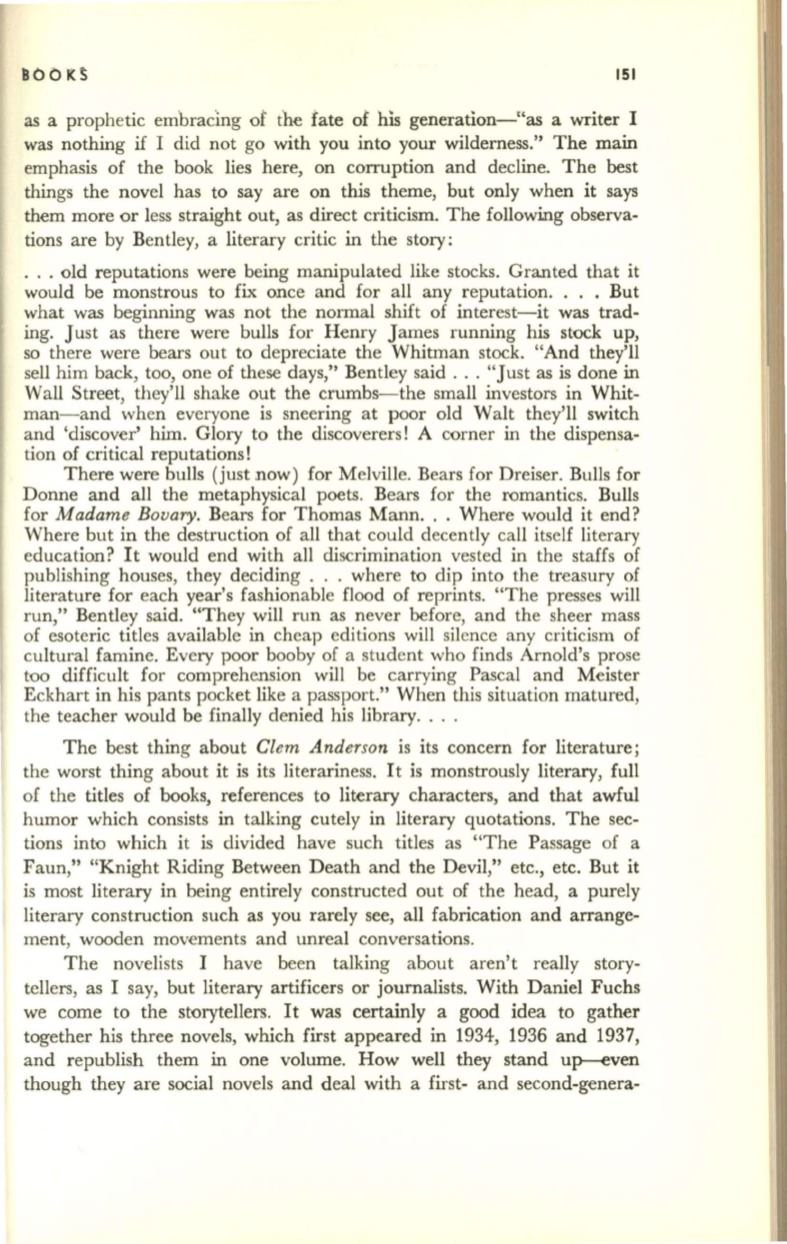
BOOKS
151
as a prophetic embracing of the fate of his generation-"as a writer I
was nothing if I did not go with you into your wilderness." The main
emphasis of the book lies here, on corruption and decline. The best
things the novel has to say are on this theme, but only when it says
them more or less straight out, as direct criticism. The following observa–
tions are by Bentley, a literary critic in the story:
... old reputations were being manipulated like stocks. Granted that it
would be monstrous to fix once and for all any reputation. . . . But
what was beginning was not the normal shift of interest-it was trad–
ing. Just as there were bulls for Henry James running his stock up,
so there were bears out to depreciate the Whitman stock. "And they'll
sell him back, too, one of these days," Bentley said .. . "Just as is done in
Wall Street, they'll shake out the crumbs-the small investors in Whit–
man- and when everyone is sneering at poor old Walt they'll switch
and 'discover' him. Glory to the discoverers! A corner in the dispensa–
tion of critical reputations!
There were bulls (just now) for Melville. Bears for Dreiser. Bulls for
Donne and all the metaphysical poets. Bears for the romantics. Bulls
for
Madame Bovary.
Bears for Thomas Mann... Where would it end?
Where but in the destruction of all that could decently call itself literary
education? It would end with all discrimination vested in the staffs of
publishing houses, they deciding . . . where to dip into the treasury of
literature for each year's fashionable flood of reprints. "The presses will
run," Bentley said. "They will run as never before, and the sheer mass
of esoteric titles available in cheap editions will silence any criticism of
cultural famine. Every poor booby of a student who finds Arnold's prose
too difficult for comprehension will be carrying Pascal and Meister
Eckhart in his pants pocket like a passport." When this situation matured,
the teacher would be finally denied his library. . . .
The best thing about
Clem Anderson
is its concern for literature;
the worst thing about it is its literariness. It is monstrously literary, full
of the titles of books, references to literary characters, and that awful
humor which consists in talking cutely in literary quotations. The sec–
tions into which it is divided have such titles as "The Passage of a
Faun," "Knight Riding Between Death and the Devil," etc., etc. But it
is most literary in being entirely constructed out of the head, a purely
literary construction such as you rarely see, all fabrication and arrange–
ment, wooden movements and unreal conversations.
The novelists I have been talking about aren't really story–
tellers, as I say, but literary artificers or journalists. With Daniel Fuchs
we come to the storytellers. It was certainly a good idea to gather
together his three novels, which first appeared in 1934, 1936 and 1937,
and republish them in one volume. How well they stand
u~ven
though they are social novels and deal with a first- and second-genera-


